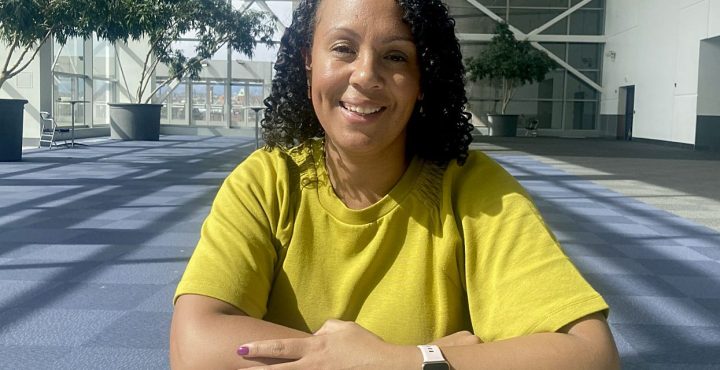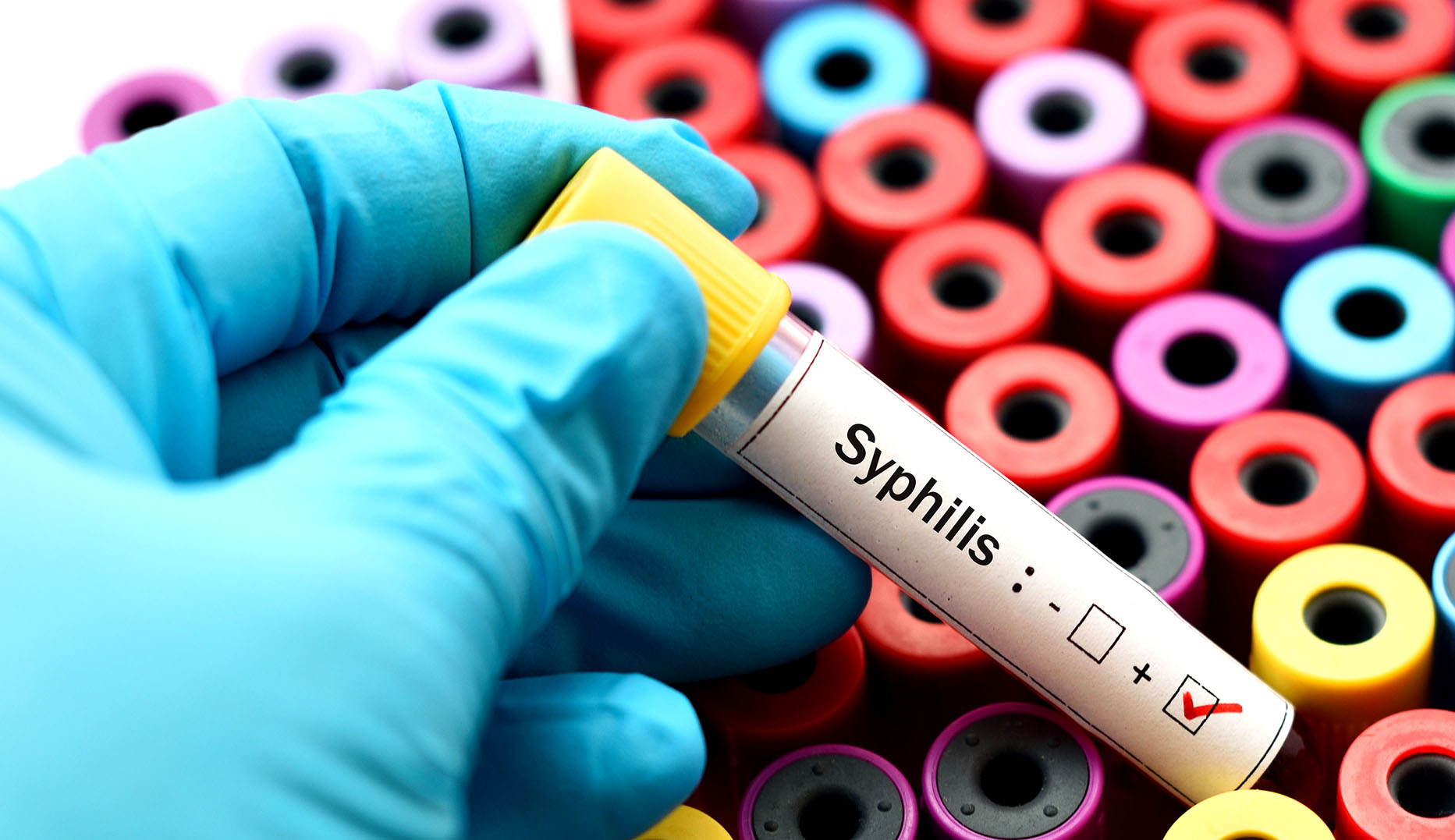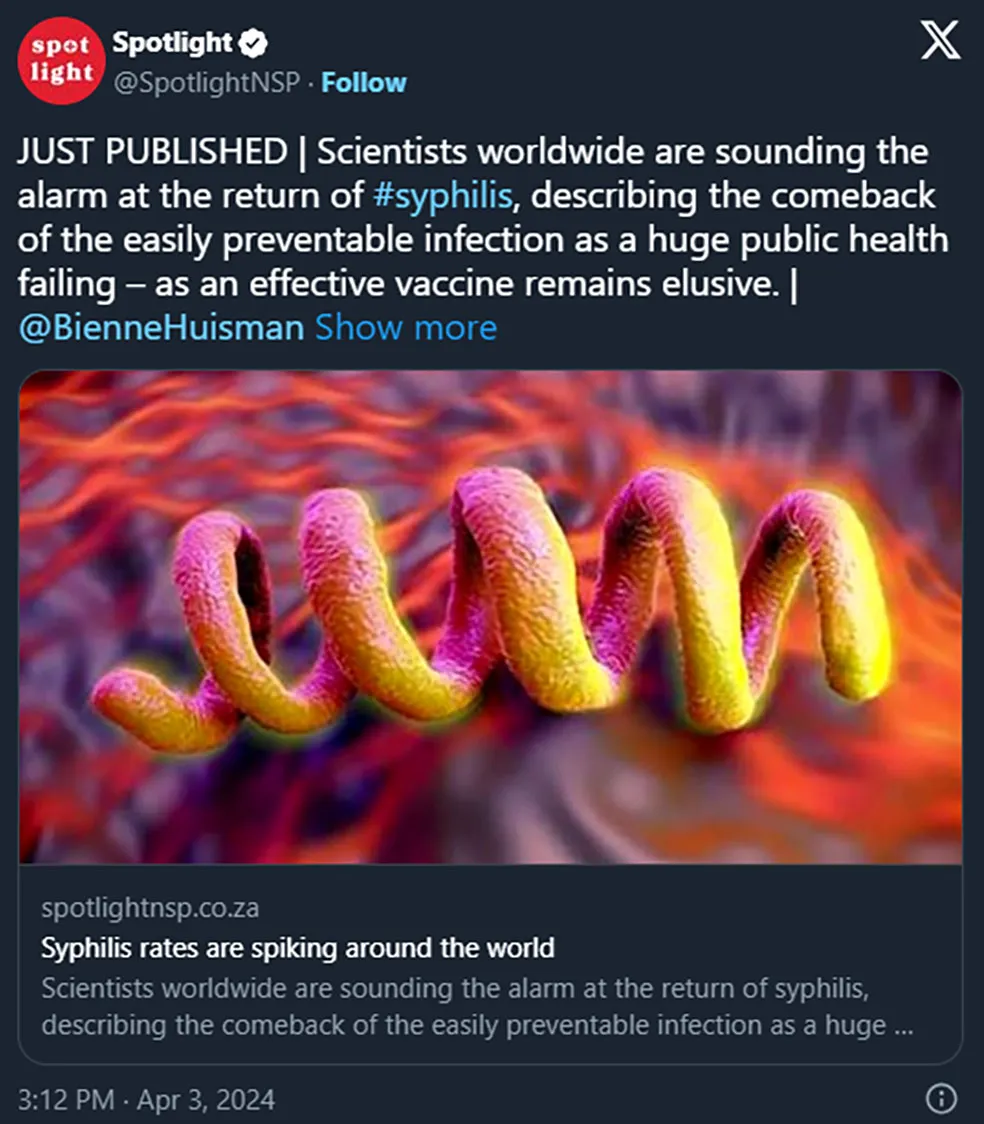SPOTLIGHT
Resurgence of syphilis a ‘failure of healthcare systems’, says leading South African researcher

Developing point-of-care tests for STIs like syphilis, chlamydia, gonorrhea and trichomoniasis inspires epidemiologist Alex de Voux. Spotlight caught up with her.
Inequality shaping health outcomes, and how poor people are disproportionately affected by infectious diseases – these are driving passions for Cape Town epidemiologist Alex de Voux.
At the Conference on Retroviruses and Opportunistic Infections (CROI) in Denver, Colorado last month – among about 3,500 scientists and scholars at the Colorado Convention Centre – De Voux moderated a session on “The Return of Syphilis”, which detailed the current global syphilis epidemic.
In a corner removed from the bustle of the conference, De Voux spoke to Spotlight about her work in public health, her focus on sexually transmitted infections (STIs), her motivations and her formative years.
Developing point-of-care tests for STIs like syphilis, chlamydia, gonorrhea and trichomoniasis inspires her. These tests would enable people to easily and cheaply screen for infections.
“These tools empower people to take their health into their own hands,” she says. “It’s about not just thinking about STIs from a clinical perspective, but framing it within a broader positive sexual health mindset – removing the stigma around sex.”
For a self-proclaimed introvert, De Voux laughs often, freely imparting colourful slices of her life. Reflecting on her past, recurring touchstones are social justice and emotional intelligence.
From Cape Town to the US
Growing up in Belhar, on Cape Town’s northern fringes, De Voux relays how she joined her father as he handed out political flyers. Both her parents were members of the New Unity Movement, a black consciousness organisation critical of the ANC.
“I remember as a kid accompanying my dad, handing out flyers for political meetings or about general elections, or whatever,” says De Voux. “I also remember being kind of really scared; because I knew we had banned literature in the house – like on Marxism, communist works at the time… I don’t even know how it got into my head, but I thought he could be arrested for having this information.”

Along with other leading scientists, Alex de Voux is sounding the alarm at increasing syphilis cases worldwide. (Photo: iStock)
As a teenager, De Voux commuted daily to Livingstone High School in Claremont, with its political struggle background. Here biology was one of her favourite subjects. She went on to initially study biochemistry at the University of Cape Town. “A lot of the work I did at the time was sort of HIV related,” she says. “But it was at the level of drug discovery or molecular, and I felt a big disconnect between what we were doing in the laboratory, the scale of it, and the impact HIV was having on the South African population. And that’s what inspired me to shift from molecular science to population health – which is epidemiology.”
Meeting Mandela
In 2005, De Voux was part of the first cohort of Mandela Rhodes Scholars – one of eight students to receive the funding – who got to meet Nelson Mandela. “So it was on UCT (the University of Cape Town’s) upper campus, near where the old Statue of Rhodes used to be,” she says. “I think Nelson Mandela was brought in through one of the side entrances. Each of us individually had to sit down next to him for a photo opportunity, and had a few minutes to chat with him. I remember him cracking a joke to set us at ease. His message was that, with this award and recognition, there were expectations of us too – to give back our skills.”
The scholarship, which funded two years of her postgraduate studies at UCT, was transformative. “It was the first time I’d been in an academic environment where EQ (emotional intelligence) was the core of the conversation. We weren’t looking at each other as scholars in terms of our disciplines, but as people, as individuals with life stories and histories and emotional qualities. We were talking about our self-worth; we were asked what kind of leaders we wanted to be, in terms of kindness, empathy, accessibility – thinking about our impact.”
On a Fulbright scholarship, she completed a PhD in epidemiology at Emory University in Atlanta, Georgia in the US. Her dissertation investigated how HIV disproportionately affects young black people in South Africa.
After five years working as an epidemic intelligence service officer at the Centers for Disease Control and Prevention – the national public health agency of the US – she returned to South Africa in 2019 with her husband and two daughters, then aged two and four, to join the National Institute for Communicable Diseases (NICD) – South Africa’s national public health institute – in Johannesburg.
Back then – at the end of 2019 – the NICD was an obscure initialism for many. This was about to change. She relays: “We literally had our team Christmas party and my boss at the time said, ‘Guys, have a good break! But I’m really worried about this virus in China’.”
Fear and panic
By January 2020, the NICD had activated its emergency operations centre, with De Voux and her colleagues at the heart of South Africa’s Covid-19 response; tracing initial Covid-19 cases, monitoring symptoms and counseling fear-stricken people over the phone. She recalls 12- to 14-hour working days during the hard lockdown – with Johannesburg “a ghost town” as she passed three to four cars on her 20km drive from home to the office.
“The number in our reception office – close to my office – was the number on the posters, and it was just ringing nonstop. People were calling in with questions and concerns. It was early days and there was a lot of fear and panic.”
In 2021, De Voux and her husband moved to Cape Town to be near family, where she joined UCT’s Division of Epidemiology and Biostatistics as a senior lecturer.
What makes a good epidemiologist? “Curiosity,” she says, “and not being afraid to be wrong. Often we are so obsessed with being right that we don’t give ourselves bandwidth to figure things out.”

Syphilis alarm
Along with other leading scientists, De Voux is sounding the alarm at increasing syphilis cases worldwide, describing the comeback of the easily preventable infection as a public health failure. With feeling, she describes the resurgence of syphilis as “a failure of healthcare systems (in South Africa and abroad) – because we have the tools, we know-how to test for it, and we know how to treat it.”
At CROI, De Voux presented a study on transmission of syphilis from pregnant mothers to their babies (resulting in congenital syphilis) which found such cases vastly underreported in South Africa. “In South Africa congenital syphilis is a notifiable condition, meaning that if a doctor delivers a baby they think has been infected they are required by law to report it to the NICD.” In this article published in 2021, Spotlight reported in-depth on the state of congenital syphilis in South Africa.
Her study relays how between January 2020 and June 2022, 36 cases of congenital syphilis were reported for every 100,000 live births in South Africa’s healthcare system. This is at least half the estimation of scientists at the World Health Organization, suggesting that scores of cases are slipping through the cracks, resulting in stillbirths, neonatal deaths (infants dying within seven days), and for those babies who survive, enduring developmental complications.
Sprints, sunrise and Table Mountain
Back home, De Voux lives in Mowbray, down the road from UCT’s health campus. She kickstarts her days with 6am bootcamp sprints at the nearby Kirstenbosch Botanical Gardens. “Every morning, your breath is taken away when the sun rises and Table Mountain is right there. It’s just amazing, the animals, the owls that have their babies, which we follow over spring…”
She likes to walk to work, special moments feeling the pulse of the society that informs her scientific enquiries. “Walking, immersing myself in my surrounds; it helps you feel more connected, keeping you grounded and in touch with the world. And it’s important, because the science and research we do, ultimately it’s connected to your city, your country, and its people.” DM
This article was published by Spotlight – health journalism in the public interest. Sign up to the Spotlight newsletter.



















 Become an Insider
Become an Insider
Indiscriminate bonking and countless fatherless children for the taxpayer to take care of is more likely the problem, not the healthcare system!
Unfortunately indiscriminate bonking now appears to be an inalienable human right as evidenced by our numbers of under age pregnancies.
It was basic healthcare practice to test every pregnant for syphilis….in 1974. Fast forward 50 years, and there should not be ANY congenital syphilis. And healthcare for pregnant women is for free. Yes, I agree, it is a huge and sad failure. In fact, this is litigation stuff. The birth of a baby with congenital syphilis should lead to litigation.
Inevitably, moralism will creep into this discussion from the keyboard warriors. Thank you for keeping it about the science and reminding us that science is for people. Thank you for giving back! Yes, indeed, it is a looming, beautiful, magnificent mountain!